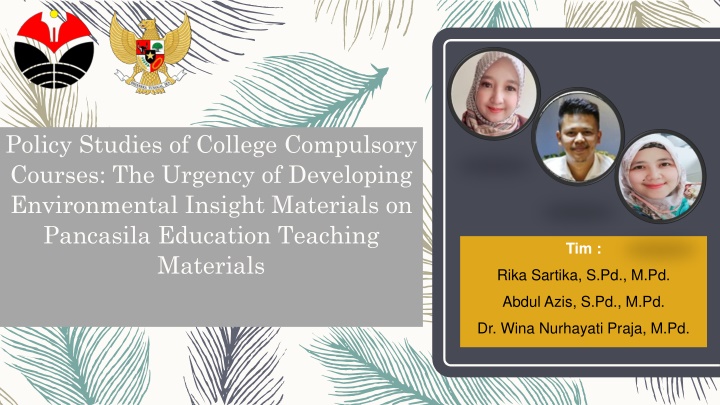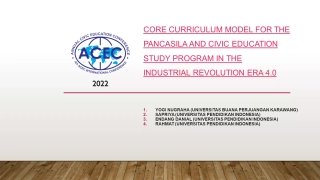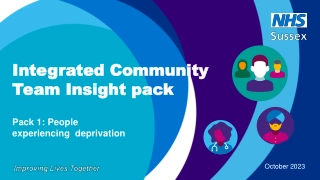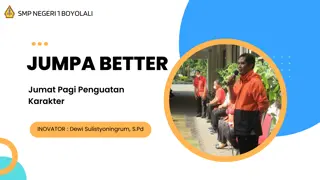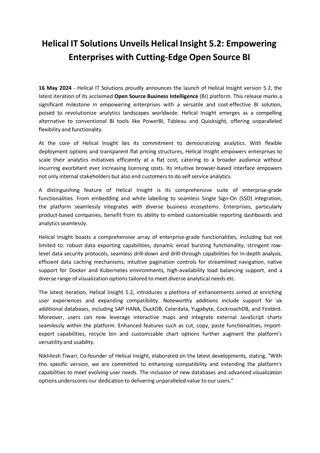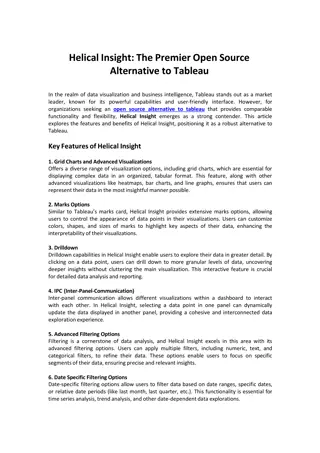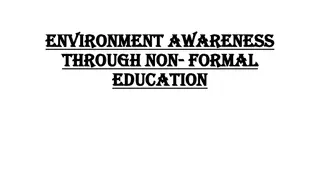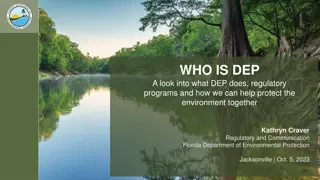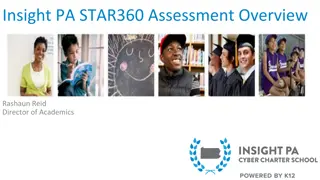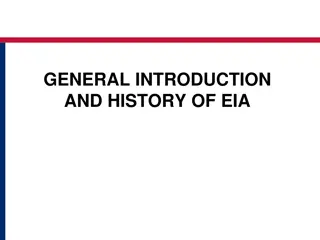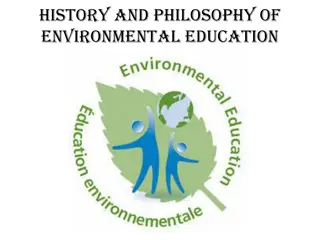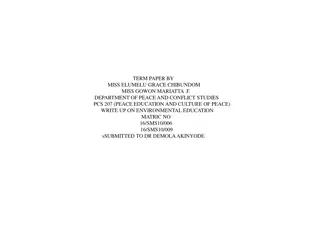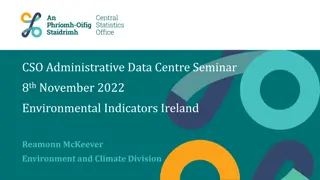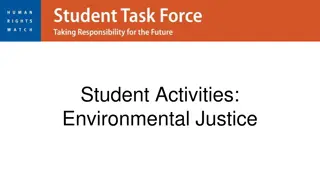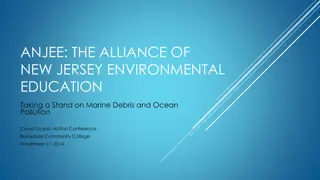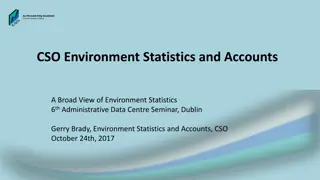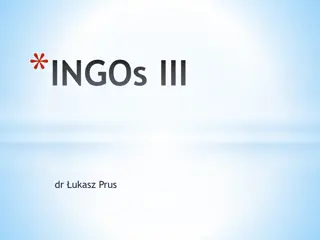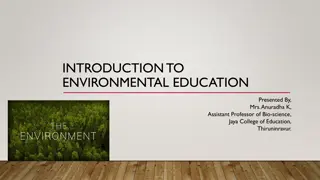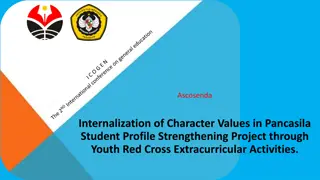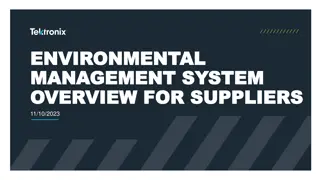Developing Environmental Insight in Pancasila Education
One characteristic needed in Pancasila Education textbooks in Higher Education is adaptability to the changing times. This study aims to provide a prototype of teaching materials that foster environmentally friendly student character and align with existing policies.
Download Presentation

Please find below an Image/Link to download the presentation.
The content on the website is provided AS IS for your information and personal use only. It may not be sold, licensed, or shared on other websites without obtaining consent from the author.If you encounter any issues during the download, it is possible that the publisher has removed the file from their server.
You are allowed to download the files provided on this website for personal or commercial use, subject to the condition that they are used lawfully. All files are the property of their respective owners.
The content on the website is provided AS IS for your information and personal use only. It may not be sold, licensed, or shared on other websites without obtaining consent from the author.
E N D
Presentation Transcript
Policy Studies of College Compulsory Courses: The Urgency of Developing Environmental Insight Materials on Pancasila Education Teaching Materials Tim : Rika Sartika, S.Pd., M.Pd. Abdul Azis, S.Pd., M.Pd. Dr. Wina Nurhayati Praja, M.Pd.
abstrak One of the characteristics that must be possessed by Pancasila Education textbooks in Higher Education is that it is adaptive to the challenges and changing times faced by students. So far, the concentration of Pancasila character building in Pancasila Education textbooks is still dominated by teaching materials that intersect with the dynamics of politics, law and state administration. Environmental problems are issues that must be addressed by Pancasila Education textbooks, where this issue is not only a national issue but also a global issue. Through the literature study method, this research seeks to provide a prototype of Pancasila Education teaching materials in Higher Education in fostering the character of students who are environmentally friendly and provide reinforcement for the implementation of policies contained in the Circular Letter of the Minister of Research, Technology and Higher Education Number: 03/M/SE/VIII/2017 concerning Strengthening Pancasila Education and General Compulsory Courses in Higher Education. The results of the study indicate that the competence of environmental insight has not been explicitly listed in the Pancasila Education textbooks used today. The resulting prototype is that each teaching material must have learning outcomes related to student environmental insight.
Introduction Pancasila has shown its position as a philosophy for the life of the Indonesian nation. (Philosphische Grondslag and Weltanschauung). The current reality is that there has been a gap between the ideals of Pancasila values (conceptual) and their practical implementation (operational) in everyday life (Latif, 2020). A conscious and systematically planned effort in grounding Pancasila conceptually towards operations so that students can become individuals who have Indonesian values with expertise in their respective fields. Although politically a conscious, planned and systematic effort has been made to ground Pancasila through the Higher Education curriculum with the implementation of Pancasila Education, in its implementation it has not yet fully achieved the expected target. One of the efforts that can be made in developing the design of learning materials is to develop the construction of learning materials from a historical and philosophical perspective. There are at least two underlying reasons. First, the historical aspect of Pancasila will provide students with knowledge, experience and spiritual construction of the importance of practicing Pancasila values in everyday life. Second, the philosophical aspect of Pancasila will provide awareness and construction of students' ways of thinking about the values of Pancasila.
Limitation And Problem Formulation Based on the description in the background section above, in general this research wants to reveal an effort to improve the quality of Pancasila Education learning in Higher Education through the Design of Pancasila Education Learning Material Development in Philosophical and Historical Perspectives in the Context of Student Character Education. Therefore, the research team tried to formulate these problems into a main problem formulation, namely "How is the Design for Development of Pancasila Education Learning Materials in Philosophical and Historical Perspectives in the Context of Student Character Education?". In order to provide detailed answers to these research questions, it can be described related to the formulation of specific problems as follows: a. How is the construction of the historical review of Pancasila on Pancasila Education learning materials?; b. How is the construction of the philosophical review of Pancasila on the Pancasila Education learning material?; and c. How to design Pancasila Education learning materials in historical and philosophical perspectives as student character education?
Research Objectives and Urgency Compile the construction of historical review of Pancasila on Pancasila Education learning materials; It is necessary to arrange the construction of Pancasila Education learning materials from a historical perspective; b. Develop the construction of a philosophical review of Pancasila on Pancasila Education learning materials; and b. It is necessary to arrange the construction of Pancasila Education learning materials from a philosophical perspective; and c. Develop the design of Pancasila Education learning materials in historical and philosophical perspectives as student character education. c. It is necessary to arrange the design of Pancasila Education learning materials in a historical and philosophical perspective as student character education
THEORY Pancasila education is viewed from the perspective of philosophy (axiology). Actualization of Pancasila Values as the Basic Philosophy of the State and Its Implementation in National Character Development. Based on the states of the arts, a common thread is obtained that historically and philosophically Pancasila is a philosophy of life for the Indonesian nation which has emerged long before the Unitary State of the Republic of Indonesia was established as an independent country. achieved results
METHOD Research Design : Research Time and Place: approach: *Organize Implementation of UPI Pancasila Education General Courses. Research subject: *Secondary Data *Results of previous research *FGD Data Collection Instruments: annotated bibliography analysis. *Literature Research *Synthesize Center for the Study of Pancasila and National Insights FPIPS UPI *Identify *Analisis Deskriptif *Formulate
RESULT As a student, in supporting the Sustainable development goals (SDGs) part of the world's rapid change, causing the entire order in this world to change. While the new order has not yet been formed. This causes the joints of life that have been believed to be true to be obsolete. The values that become role models in life have lost their authority, so people are confused. This confusion causes various crises, especially when there is a moral crisis whose impact is felt in the political, economic, educational, socio-cultural fields, especially in developing countries like Indonesia. In order to respond to these conditions, the government needs to anticipate so that a more worrisome situation does not arise. One of the solutions taken by the government, in maintaining the values of life role models in the nation and state, is to recognize and reconstruct the content of Pancasila education materials. Pancasila education materials must be able to answer some 21st century skills, communication, collaborative, and critical. Students can communicate in a good, wise, effective, and efficient pattern (Martini 2018). Students are advised to be able to do collaborative learning, so that by working together students can better interpret the values of Pancasila with life because Indonesia is a pluralistic country, so ethics are needed in the 21st century (Baroya, 2018). The behavior of students who are creative, innovative, digitally literate, proficient in technology, good at communicating both regionally and internationally. Pancasila as the philosophy/values of the nation, the basis of the state, and the national ideology with all its implications (Nurgiansyah, 2021). The content of Pancasila education is still considered difficult and unattractive, because some of the respondents stated that speaking philosophically and historically about Pancasila is a bit stiff and rigid. Not adapted to the dynamics that occur in life. The flow of globalization, modernization, digitalization, the industrial revolution 4.0, the 21st century, makes the Indonesian state have to open up more and more in reconstructing and recognizing Pancasila education. The material and content of Pancasila education must be adapted to the challenges of the times (Ghufron, 2018). The content of Pancasila education materials has an important role in shaping the character of students. Students as the nation's successors, who must have a national character that is responsible, solid, strong, and full of innovation. So that the Indonesian state is able to exert a major influence on the international world through the strong footing of its nation's ideology, namely Pancasila. Through strengthening more complex and comprehensive material, students can become world composers. Especially at this time, the country and the world are full of challenges and dynamics that occur (Mulyasari, 2021). The emergence of the SDGs has a good influence on the country, meaning that Indonesia must be able to survive on its cultural footing but must also be able to develop in a culture in accordance with the SDGs which is full of a touch of digitalization and advanced technology.
DISCUSSION In accordance with the reference to the national education development strategy (Law No. 20 of 2003 concerning the National Education System), it is determined that: 1. The higher education curriculum needs to be designed based on competence that is in line and in line with the curriculum design in the field of study in universities, 2. The learning process has an interest-based approach. students who are educative and dialogical, 3. The professionalism of lecturers as educators needs to be continuously improved. Compared to conventional media, new media provide many conveniences that allow wider participation of users in public communication (Swigger, 2012; Nasrullah, 2017). The loss of 'gatekeeper' in new media allows users to produce communication messages because it is not one to many as in conventional media, but one to one, one to many, many to many, and so on (Chaffee and Metzger, 2001). In the world of new media, not only is professionalism very problematic (Nichols, 2019; Kapolkas, 2019), but centers of power are spreading and ethics are becoming increasingly difficult to enforce. Thus, digital literacy is expected to provide the ability for users to communicate in a better way, taking more benefits for users (Rianto, 2016; Juliswara, 2017; Potter, 2011; Galih, 2017; Turow, 2014). Based on the theory and understanding above, to support sustainable development goals, recognition and reconstruction of the content of Pancasila education must be carried out. and disseminate 21st century education agreed upon by 9 education ministers from the most populous countries in the world, including Indonesia in New Delhi 1996, is expected to play an effective role in terms of: 1. Preparing individuals, as responsible citizens and members of society; 2. Instilling basic sustainable development for human welfare and environmental sustainability; and 3. Organizing education oriented to the mastery, development, and dissemination of science, technology and art for the benefit of humanity. (Wijaya et al 2016).
CONCLUSION A nation has its own ideology and view of life which taken from the values that live and develop in the nation itself. Pancasila was excavated from the Indonesian nation itself which has grown and developed since the birth of the Indonesian nation. The period that can be equated with the birth of the Indonesian nation which has a territory like independent Indonesia today, is the era of the Sriwijaya and Majapahit kingdoms. At that time, divine values, such as belief in God had developed and an attitude of tolerance had also been born, as were just and civilized human values, as well as other precepts. After going through a long historical process, the values of Pancasila were has gone through maturation, so that the leaders of the Indonesian nation when they were about to establish the Republic of Indonesia made Pancasila the basis of the state. In the course of the Indonesian state administration, there have been changes and changes to the basic constitution, such as the 1945 Constitution being replaced by the RIS Constitution, then changing to the Provisional Constitution and back again to the 1945 Constitution. In the preamble to the Constitution, the values of Pancasila are still listed . This shows that Pancasila has been agreed as the value that is considered the highest truth.
References Darmodiharjo, D. 1996. Pokok-pokok Filsafat Hukum. Jakarta: Gramedia Pustaka Utama. Darmadi, H. (2013). Metode Penelitian Pendidikan Dan Pengembangan. In Bandung. Farisi. M.I. (2010). Pengembangan Asesmen Diri Siswa (Student Self-Assessment) sebagai Model Penilaian dan Pengembangan Karakter. Artikel disampaikan pada Konferensi Ilmiah Nasional Asesmen dan Pembangunan Karakter Bangsa HEPI UNESA 2012. Notonagoro. (1967). Beberapa Hal Mengenai Falsafah Pancasila: Pengertian Inti-Isi Mutlak Daripada Pancasila Dasar Falsafah Negara, Pokok Pangkal Pelaksanaan Secara Murni Dan Konsekuen. Jakarta: Pancuran Tudjuh, Cetakan Kedua. Latif, Y. (2020). Wawasan Pancasila Bintang Penuntun untuk Pembudayaan. In mizan expose. Undang Undang Nomor 12 Tahun 2012 tentang Pendidikan Tinggi, Republik Indonesia (2012). Paristiyanti Nurwadani, D. (2016). Pendidikan kewarganegaraan di perguruan tinggi. Thema Publishing. Syaodih, N. (2009). Metode Penelitian Pendidikan. Bandung: PT. Remaja Rosdakarya. Sugiyono, P. D. (2015). Metode Penelitian Pendidikan. Bandung: Penerbit AlphaBeta. Triandini, E., dkk. (2019). Metode Systematic Literature Review untuk Identifikasi Platform dan Metode Pengembangan Sistem Informasi di Indonesia. Indonesian Journal of Information Systems. https://doi.org/10.24002/ijis.v1i2.1916. 19 Yassa, S. (2018). Pendidikan Pancasila ditinjau dari perspektif filsafat (aksiologi). Jurnal Citizenship: Media Publikasi Pendidikan Pancasila Dan Kewarganegaraan. https://doi.org/10.12928/citizenship.v1i1.10442 Zabda, S. S. (2016). Aktualisasi Nilai-nilai Pancasila sebagai Dasar Falsafah Negara dan Implementasinya Dalam Pembangunan Karater Bangsa. Jurnal Pendidikan Ilmu Sosial.
Thank you very much assalamualaikum.wr.wb.
